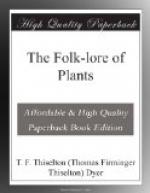“My mother had a maid called Barbara:
She was in love; and he she loved proved
mad,
And did forsake her: she had a song
of willow;
An old thing ’twas, but it expressed
her fortune,
And she died singing it: that song
to-night
Will not go from my mind.”
According to another adage:—
“Willows are weak, yet they bind other wood,”
The significance of which is clear. Then, again, there is the not very complimentary proverbial saying, of which there are several versions:—
“A spaniel, a woman, and a walnut-tree,
The more they’re beaten, the better
they be.”
Another variation, given by Moor in his “Suffolk Words” (p. 465), is this:—
“Three things by beating better
prove:
A nut, an ass, a woman;
The cudgel from their back remove,
And they’ll be good
for no man.”
A curious phrase current in Devonshire for a young lady who jilts a man is, “She has given him turnips;” and an expressive one for those persons who in spite of every kindness are the very reverse themselves is this:—
“Though you stroke the nettle
ever so kindly, yet it will sting you;”
With which may be compared a similar proverb equally suggestive:—
“He that handles a nettle tenderly is soonest stung.”
The ultimate effects of perseverance, coupled with time, is thus shown:—
“With time and patience the leaf
of the mulberry tree
becomes satin.”
A phrase current, according to Ray, in Gloucestershire for those “who always have a sad, severe, and terrific countenance,” is, “He looks as if he lived on Tewkesbury mustard”—this town having been long noted for its “mustard-balls made there, and sent to other parts.” It may be remembered that in “2 Henry IV.” (Act ii. sc. 4) Falstaff speaks of “wit as thick as Tewkesbury mustard.” Then there is the familiar adage applied to the man who lacks steady application, “A rolling stone gathers no moss,” with which may be compared another, “Seldom mosseth the marble-stone that men [tread] oft upon.”
Among the good old proverbs associated with flax may be mentioned the following, which enjoins the necessity of faith in our actions:—
“Get thy spindle and thy distaff ready, and God will send the flax.”
A popular phrase speaks of “An owl in an ivy-bush,” which perhaps was originally meant to denote the union of wisdom with conviviality, equivalent to “Be merry and wise.” Formerly an ivy-bush was a common tavern sign, and gave rise to the familiar proverb, “Good wine needs no bush,” this plant having been selected probably from having been sacred to Bacchus.
According to an old proverb respecting the camomile, we are told that “the more it is trodden the more it will spread,” an allusion to which is made by Falstaff in “I Henry IV.” (Act ii. sc. 4):—
“For though the camomile, the more
it is trodden on, the faster it
grows; yet youth, the more it is wasted,
the sooner it wears.”




